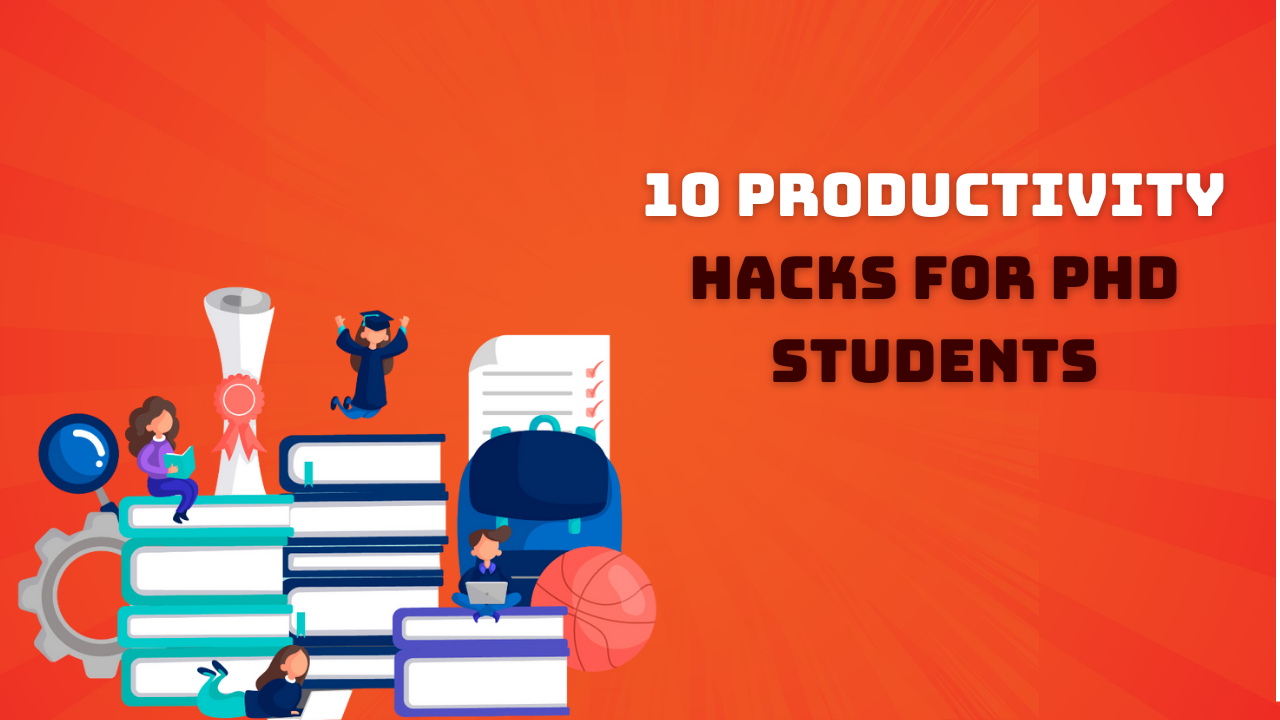10Jun

A PhD is not just a degree; it’s a full-time commitment to long hours, critical thinking, deadlines, and endless research. Balancing academic work, teaching duties, personal life, and your sanity is a real challenge. That’s why having a productivity strategy is not a luxury—it’s a necessity. In this blog, we’ll dive deep into Hacks for PhD Students that will help you stay focused, organized, and mentally resilient through your academic journey. These Hacks for PhD Students are designed to simplify your workload and boost your efficiency every step of the way.

The first step to being productive is to organize your workflow. You don’t have to use complex tools—just choose a system that works for you.
Set aside time every Sunday to plan your week. Break your work into achievable tasks.
This habit reduces overwhelm and improves your ability to focus on what truly matters.
PhD students are often pulled in multiple directions—teaching, research, conferences, journal submissions, and sometimes part-time work.
To be productive, protect your time like gold.
Remember: every “yes” to others is a “no” to your thesis if you’re not careful.
If a task takes less than 2 minutes, do it immediately.
This keeps your task list clean and prevents minor items from piling up into productivity blockers.
Distractions are the enemy of productivity—especially for PhD students dealing with dense reading, coding, or data analysis.
Bonus tip: Have a dedicated workspace—even if it’s a corner of your room—to trigger your brain into “research mode.”
Don’t waste time reinventing the wheel. Use academic tools designed to make life easier:
These tools automate repetitive tasks and save you hours every week.
Batching is doing similar tasks together to reduce context switching. This is a productivity hack PhD students often overlook.
This keeps you in flow and boosts efficiency by up to 40%, according to productivity studies.
Visual feedback helps maintain motivation and accountability.
This gives you a sense of control, especially during long, open-ended research phases.
Being productive doesn’t mean working 24/7. In fact, rest is part of the process.
Burnout is real in academia. Schedule recovery time like any other task. A well-rested brain is a more productive one.
Accountability keeps you on track, especially during solitary phases like thesis writing.
Even having a virtual check-in can push you to meet deadlines and avoid procrastination.
Remember why you started. Keep your research question, personal goals, or future vision visible—on a post-it, vision board, or your phone wallpaper.
This sense of purpose gives meaning to the hard days and helps you keep going even when things feel slow or uncertain.
Being a PhD student is like running a marathon, not a sprint. By applying these 10 Hacks for PhD Students, you’ll not only become more efficient, but also reduce stress, maintain focus, and make real progress on your research goals. These Hacks for PhD Students can evolve with you—what works in Year 1 may not work in Year 3. Stay flexible. Adapt, refine, and keep showing up—one focused session at a time.
Kenfra Research understands the challenges faced by PhD scholars and offers tailored solutions to support your academic goals. From topic selection to advanced plagiarism checking.
How to Write a Winning Technical Proposal, A step by Step Guide / Kenfra Research Crafting a winning technical proposal... read more
PHD Journal Publication Assistance by Kenfra Research Are you a Ph.D. candidate seeking to publish your research in esteemed read more
Carnegie Mellon University (CMU): Carnegie Mellon University (CMU) is a prestigious and well-respected private research university located in Pittsburgh, Pennsylvania, USA.... read more
Doctoral Entrance Tests (DET) are commonly conducted by universities and institutions as part of the admission process for doctoral (Ph.D.)... read more

In today’s complex business world, understanding organizational behaviour, management strategies, and decision-making processes requires detailed insights. This is where case... read more

Publishing your research in a peer-reviewed journal is one of the most effective ways to share your academic contribution with... read more
Conquer Your PhD Implementation: Expert Assistance for Research Success This blog post from Kenfra Research, your trusted partner in PhD... read more

Publishing in the right journal is one of the most important steps in an academic career. Before submitting your research... read more
WhatsApp us
Leave a Reply